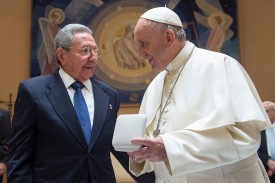
HAVANA (CNS) – The Cuban bishops’ conference announced that Pope Francis will visit the island Sept. 19-22.
An advisory posted on the bishops’ conference Facebook page May 11 said the visit will begin in Havana. Other events under consideration include a visit to the city of Holguin, in eastern Cuba, as well as a visit to the Shrine of Our Lady of Charity of El Cobre, the patroness of Cuba, and the nearby city of Santiago de Cuba, the second-largest city on the island.
From Santiago, the pope is expected to take off to his Sept. 22-27 visit in the U.S.
The pope’s trip to Cuba will mark the third time a pope has visited the island. St. John Paul II visited Cuba in 1998, and Pope Benedict XVI visited in 2012.
On May 10, the pope met with Cuban President Raul Castro at the Vatican, where Castro thanked him for the “active role he played in improving relations between Cuba and the United States of America,” said Jesuit Father Federico Lombardi, Vatican spokesman.
After spending close to an hour with Pope Francis, President Castro told reporters he is so impressed by what the pope does and says that he might start praying and could even return to the Church.
“I had a very agreeable meeting this morning with Pope Francis. He is a Jesuit, as you well know. I am, too, in a certain sense because I was always in Jesuit schools,” Castro told reporters.
“When the pope comes to Cuba in September, I promise to go to all his Masses and will do so happily,” the president said.
Castro said he left his meeting with the pope “very much struck by his wisdom, his humility and all the virtues that we all know he has.”
“I read all the speeches of the pope,” Castro said, and he told reporters, “if the pope continues to speak this way, sooner or later I could start praying again and return to the Catholic Church. I’m not kidding. I’m a communist, (a member) of the Cuban Communist Party. The party has never admitted believers.”
Today, he said, the country allows people to hold important positions even if they are not members of the party. “It’s a step forward,” he said, although many of the reforms he would like to make are still being implemented.
In December, Castro and President Obama announced that their nations were working toward re-establishing diplomatic relations. Both credited Pope Francis with helping through his letter-writing and by hosting a meeting at the Vatican between Cuban and U.S. representatives.
Castro also relayed to the pope the expectations of the Cuban people for his upcoming trip to the nation and outlined how the preparations were going, Father Lombardi said.
During the traditional exchange of gifts, Castro gave Pope Francis a commemorative medal featuring Havana’s cathedral and, in honor of Pope Francis’ concern for migrants, a contemporary painting of a cross made up of migrants’ boats with a migrant kneeling before it in prayer.
The Cuban artist known as Kcho, who made the painting, was present at the audience and told Pope Francis he was inspired by the pope’s expressions of concern for the thousands of migrants who risk their lives crossing the Mediterranean Sea seeking security and a better life in Europe.
Pope Francis gave Castro a copy of his apostolic exhortation, “The Joy of the Gospel,” and a large medallion featuring St. Martin of Tours covering a poor man with his cloak. Father Lombardi said Pope Francis told Castro the medallion is a reminder not only of the obligation “to assist and protect the poor, but also to actively promote their dignity.”
Catholic News Service’s Cindy Wooden contributed to this article.
